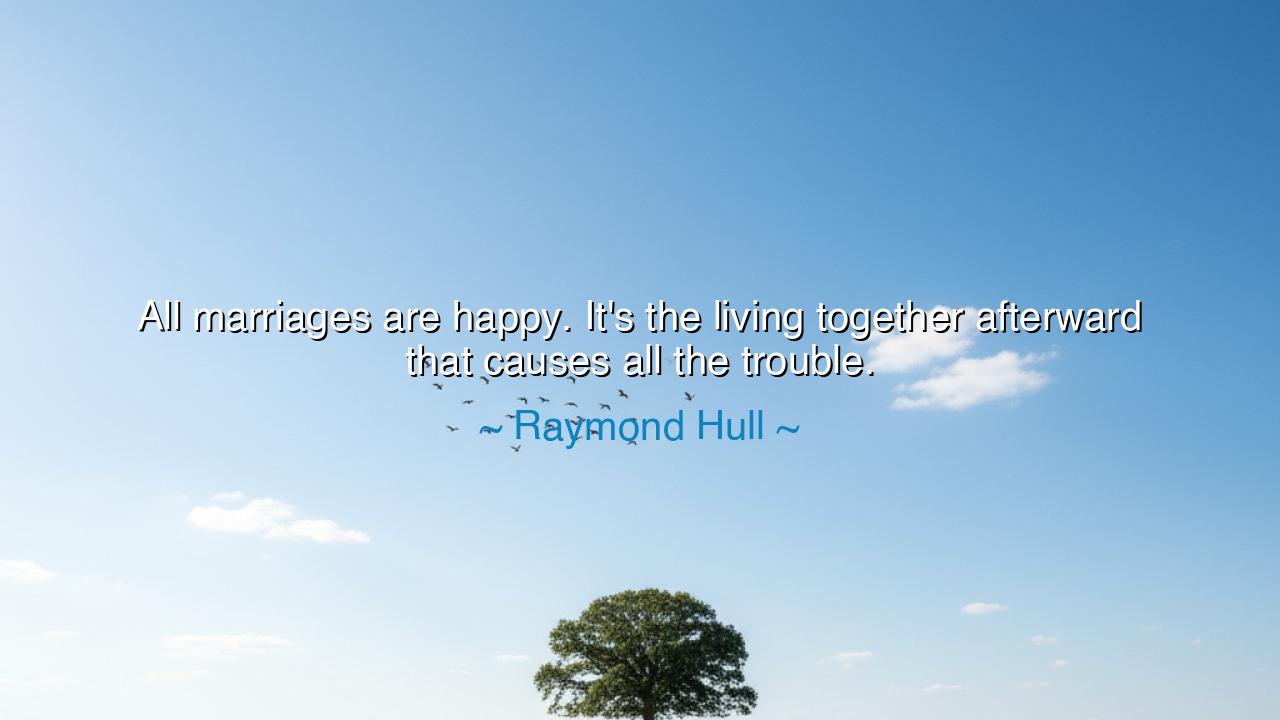
All marriages are happy. It's the living together afterward that
All marriages are happy. It's the living together afterward that causes all the trouble.






“All marriages are happy. It’s the living together afterward that causes all the trouble.” Thus spoke Raymond Hull, a playwright and philosopher of the human spirit, whose wit often carried the weight of hard-won truth. His words, though tinged with humor, pierce to the very heart of what it means to love another in the enduring covenant of marriage. At the altar, in the glow of promise and ceremony, all is joy; hearts are lifted, hopes are bound together, and the world seems transfigured by the light of affection. But when the music fades and the daily life begins—when love must leave the realm of dreams and enter the dust and discipline of reality—there, as Hull tells us, begins the true trial of devotion.
The origin of this wisdom lies not in cynicism but in observation. Raymond Hull, known for co-authoring The Peter Principle, understood human nature with a clear and unsentimental eye. In this quote, he speaks as one who has seen how the passions of love, bright as they are, often falter beneath the slow pressure of familiarity. For love, when untested, is an illusion; it is in the living together, in the ordinary rhythm of shared life—its quarrels, its disappointments, its quiet compromises—that the true nature of love is revealed. Marriage begins in happiness, yes, but it endures through patience, forgiveness, and the continual rediscovery of grace in imperfection.
There is ancient truth in his jest. For even the ancients—those who built civilizations and wrote of gods and heroes—knew that the battle of life is not waged in the grand moments, but in the daily ones. The philosopher Aristotle once said that friendship is the soul of marriage, for passion alone is fleeting. The poet Ovid warned that love is easy to begin but hard to sustain. And from the East, the sages of the Vedas taught that marriage is not a union of pleasure but a sacred discipline—two souls learning to walk as one, even when their feet ache. Hull’s humor is thus a reflection of this timeless wisdom: that the wedding is a celebration of hope, but marriage is a practice of endurance.
Consider the story of Eleanor and Franklin Roosevelt, two towering figures in history whose marriage was not one of simple happiness, but of perseverance and purpose. Their love was tested by betrayal, by ambition, and by the burdens of leadership. Yet they did not part; they evolved. What began as a romance became a partnership that shaped the destiny of a nation. Theirs was not an easy union, but a living one—proof that the trouble of living together can also be the forge in which strength, respect, and even a different kind of love are born. It is easy to love the dream of a person; it is harder, and holier, to love them as they are.
Hull’s words remind us that the illusion of perfect happiness in marriage is as fragile as mist. The first joy is born of enchantment, but the enduring joy comes from understanding. Living together strips away illusion. It reveals the small habits that irritate, the unspoken wounds, the clashing desires. Yet, if both hearts are humble, this unveiling is not destruction but refinement—the polishing of two souls against one another until they shine brighter than they could alone. For happiness in marriage is not given—it is crafted, day by day, through the sacred labor of coexistence.
But Hull’s humor also holds a warning: that many enter marriage expecting perpetual happiness, only to flee when trouble arrives. They mistake the end of infatuation for the end of love. Yet true love, like a fire, must sometimes dim before it deepens. The wise do not despair when the spark fades; they tend to it. They learn that happiness in marriage is not constant, but cyclical—a tide that rises and falls with the seasons of life. The trouble, then, is not a curse but an invitation: to grow in patience, to practice forgiveness, to rediscover the sacred in the mundane.
So, my listener, take this teaching to heart: marriage is not the preservation of happiness, but the creation of it. Do not fear the trouble that follows the wedding day, for it is in that trouble that love proves its truth. Speak gently when tempers rise. Listen when pride would make you deaf. Remember that two imperfect souls cannot make a perfect life—but they can make a beautiful one, if they endure with grace.
Thus, Raymond Hull’s jest becomes a mirror of wisdom: that the first joy of marriage is a gift, but the lasting joy is a craft. To live together is to labor together—to build not the fantasy of love, but the reality of it. And those who persevere through the trouble will find that, beyond the trials, beyond the daily wear of living, there lies a happiness far deeper than the one that began at the altar—a happiness not of illusion, but of truth.






AAdministratorAdministrator
Welcome, honored guests. Please leave a comment, we will respond soon